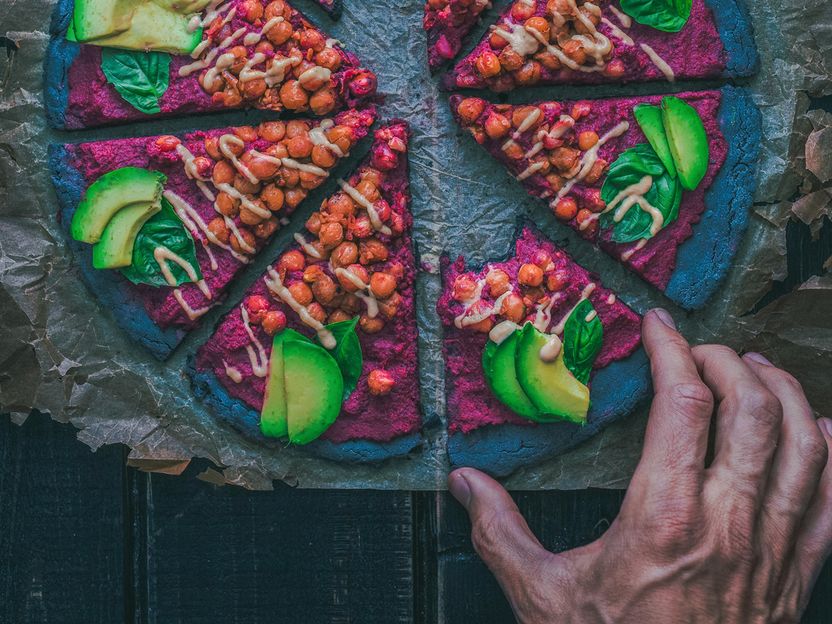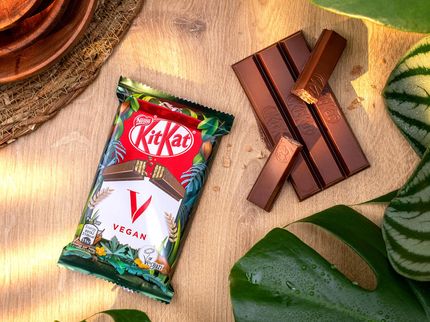Vegan vegan couples become happier
Dating study
Advertisement
Survey of the dating platform Gleichklang finds that relationships become happier and more stable when both relationship partners live vegan than when vegans and meat-eaters are together.

unsplash
Is a shared vegan lifestyle a good basis for satisfaction and stability in a relationship - or do vegans become just as happy with meat-eating partners?
The Kennenlernplattform Gleichklang.de wanted to know this and questioned in addition 635 vegan living persons, who all lived at the time of the inquiry in a relationship.
Short summary of the results
In the inquiry Veganer with vegan relationship partners described happier and more stable relations than Veganer, which led relations with meat eating persons.
Regardless of whether their own relationship partners lived vegan or ate meat, the vast majority of respondents said they would like vegan relationship partners.
As advantages for a common vegan way of life in relationships the respondents named an easement of the everyday life, a better fit of morals and ethics, a deeper and more harmonious understanding, the possibility to strengthen themselves together in the vegan way of life, the avoidance of confrontation with animal products in the own household or with the meat eating of partners, as well as the easement of a common child education.
Vegan women were much less likely to be with vegan relationship partners than vegan men, although their desire for vegan partners was as great as the corresponding desire of men. The reason for this was that there are significantly more vegan women than men, which was also reflected in the current survey.
Survey in detail
Sample and survey methodology
Participants for the survey became via Gleichklang's newsletter, the website vegan.eu operated by Gleichklang, and via paid Facebook ads targeting people with a focus of interest in veganism.
Only data from people who described in the survey that they ate a purely plant-based diet and consumed neither meat or fish nor milk or eggs were included in the analysis.
In addition, only people who were currently in a relationship and whose relationship partner either also lived vegan or ate meat were included.
The survey involved 635 people who met the inclusion criteria mentioned above. There were 479 women, 137 men, and 19 non-binary participants. The preponderance of women in the sample is consistent with the preponderance of women among vegan individuals.
The average age of respondents was 34.9 years and ranged from a minimum of 16 years to a maximum of 84 years. On average, the duration of the current relationship was 6.8 years.
The survey was conducted as an online survey and included a quantitative part with checkbox options and a qualitative part. The qualitative part was related to the analysis of the benefits of a shared vegan lifestyle in partnerships, freely named by the respondents.
In the quantitative survey, the participants were asked about their global relationship satisfaction and the stability of their relationship. Here you were presented with the following two questions on a four-point scale(strongly disagree, disagree, agree, strongly agree):
- i am completely satisfied and happy with my partnership.
- my partnership is stable and lasting
Respondents were also asked - regardless of whether their relationship partners were vegan or meat-eaters - whether or not they wanted vegan relationship partners.
Information was also collected on age, gender, education level, relationship duration, duration of vegan lifestyle, strictness of vegan lifestyle(avoiding honey? avoiding gelatin? etc.).
In addition, respondents were asked to describe in a free text possible advantages or disadvantages of a shared vegan lifestyle in a relationship. This resulted in 549 free texts, which were qualitatively evaluated in a thematic analysis.
The investigation was led by the diploma psychologist Guido F. Gebauer.
Results of the investigation
Percentage of vegan relationship partners
- In 57.2% of the respondents, the partners also lived vegan, while in 42.8% of the respondents, the partners continued to eat meat.
- Vegan men were much more likely to have vegan relationship partners (75.9%) than female respondents, where only 48.6% of relationship partners lived vegan. Among non-binary individuals, the percentage of relationship partners living vegan was 68.4%.
Relationship satisfaction
- 56.7% of respondents with vegan partners affirmed satisfaction with their relationship at the strongest level (strongly agree), while this percentage was only 34.9% for respondents with meat-eating partners.
- 5.5% of respondents with vegan partners denied satisfaction with their relationship (strongly disagree or disagree), while 23.2% of respondents with meat-eating partners denied relationship satisfaction.
- 41.9% of respondents with meat-eating partners gave simple agreement but not strong agreement on relationship satisfaction, while this percentage was 37.7% for respondents with vegan partners.
Relationship stability
- 66.9% of respondents with vegan partners strongly agreed that their relationship was stable and lasting, while only 46.3% of respondents with meat-eating partners strongly agreed with this statement.
- 5.5% of respondents with vegan partners denied relationship stability (strongly disagree or disagree). This percentage was 15.1% for respondents with meat-eating partners.
- 38.6% of respondents with meat-eating partners slightly agreed, but did not strongly agree, that their relationship was stable. This percentage was 27.5% for respondents with vegan partners.
Statistical evaluation
Statistical evaluation showed the following results:
- Respondents with vegan partners affirmed that they were satisfied with their relationship and that their relationship was stable significantly more often (strongly agree or agree) than respondents with meat-eating partners.
- Respondents with meat-eating partners were significantly more likely to deny (strongly disagree or disagree) satisfaction with their relationship and the stability of their relationship than respondents with vegan partners.
- When respondents with vegan partners affirmed satisfaction or stability with their relationship, they were significantly more likely to strongly affirm than respondents with meat-eating partners, who were less likely to choose the strong form of affirmation.
What did respondents wish for?
- 95.6% of respondents with vegan partners said they wanted vegan partners in a relationship. 2.5 wished for vegetarian partners, 1.4% did not care, and 0.4% said they wished for pescetarian partners (fish eaters). No one indicated they wished for meat-eating partners (mixed diet with meat).
- 64.3% of respondents with meat-eating partners said they would like vegan partners in a relationship. 23.5% indicated that they did not care. 11.8% wanted vegetarian partners and 0.4% wanted pescetarians (fish eaters). Again, no one in this group desired partners who ate a mixed diet with meat.
Influences of gender, age and other factors
No or only trivial correlations between gender, age, duration of the vegan lifestyle and degree of strictness of the vegan lifestyle with the satisfaction and stability of the partnership occurred.
Among men and among women, significantly greater satisfaction and higher stability were found in relationships with vegan than with meat-eating partners. For non-binary individuals, the small number of cases did not allow for meaningful analysis.
Although the vegan women surveyed were significantly more likely to have meat-eating partners than the men surveyed, they desired vegan partners just as often as men did.
Why were vegan-vegan relationships happier?
In the survey results, relationships with a shared vegan lifestyle were shown to be happier and more stable than relationships between vegans and meat-eaters. In addition, a large majority of vegans desired vegan partners. This desire was present even among those vegans who were currently in a relationship with a meat-eating person.
But what were the reasons why vegan-vegan relationships are happier and more stable? What did respondents experience as benefits of living a vegan lifestyle together?
To answer this question, the available 549 free texts were coded according to their content. The following six basic themes were identified.
(1) Ease of everyday life: By the agreement in the vegan way of life the everyday life is facilitated, in particular the purchase, meal and cooking, whereby in addition, the care of social contacts was experienced by some asked ones with common Veganismus as simpler.
(2) Fit of morals and ethics: Shared veganism was said to be in line with basic ethical values, with shared ethics being important and beneficial to a relationship.
(3) Deeper and more harmonious understanding: The relationship was improved by less conflict, more connectedness, and better conversations, they said.
(4) Strengthening vegan lifestyle: Shared veganism creates more motivation and opportunities to further develop the vegan lifestyle, learn new things, protect against temptations and relapses, or advocate for the vegan lifestyle together.
(5) Avoidance of negative feelings: The common Veganismus protects against stressful confrontations and negative feelings, like disgust, anger or sadness, which can be released by animal products in the own household or the consumption of animal products by partners. Kissing and tenderness would be facilitated.
(6) Facilitated child rearing: The child education is facilitated by a common vegan life, since in such a way a vegan nutrition and education of the children can take place without conflicts and discussions.
Interpretation and psychological classification
The psychologist Gebauer summarizes the findings to the effect that vegan living people become happier and more stable in their relationships if their relationship partners also live vegan. The longing for vegan relationship partners exists even among those who currently live in a relationship with a meat-eating person.
The findings also showed that the desire for vegan relationship partners actually strongly shaped vegans' choice of partners:
While the proportion of vegans in the general population is between 1 - 2%, the majority of respondents indicated that their relationship partners were also vegan.
It becomes clear that Veganer looked quite obviously purposefully for vegan relationship partners.
Psychologically these findings are to be explained well:
A high relationship quality can develop and remain, if central moral convictions harmonized with one another, conflicts are well solvable, the common everyday life can be arranged positively, the own person is brought in and developed further, physical proximity is experienced as positive without disgust feelings, as well as children can be educated after common principles on both sides.
Veganism is a strongly ethically coined way of life. The confrontation with animal products in the own household or with a meat eating partner is therefore for many Veganer a psychological load.
Desire for vegan relationship partners comprehensibly
The desire for vegan relationship partners is not about rigidity, intolerance or a lack of acceptance of diversity, but about the authentic desire of people to experience a particularly deep form of connection and togetherness in their most intimate relationships.
Especially for people who have strong ethical convictions that conflict with mainstream society, Gebauer says intimate relationships can become a protective space that enables them to live their own lifestyle while maintaining a psychological balance.
Gebauer advises however vegan partner-looking for, with their partner search not only already vegan living persons to consider, but also not yet vegan living persons to include, who are open for a change to the vegan way of life. Thus the search area is extended, without renouncing the desire for agreement in the basic attitudes.
Note: This article has been translated using a computer system without human intervention. LUMITOS offers these automatic translations to present a wider range of current news. Since this article has been translated with automatic translation, it is possible that it contains errors in vocabulary, syntax or grammar. The original article in German can be found here.
































































